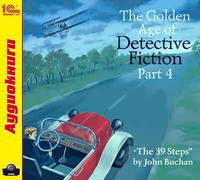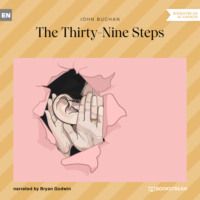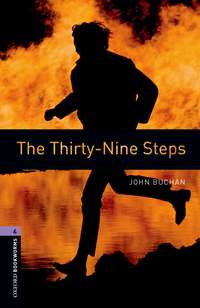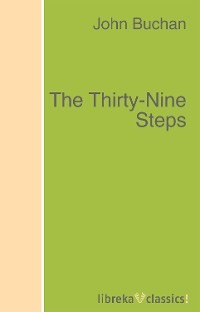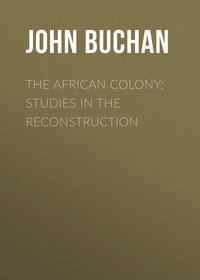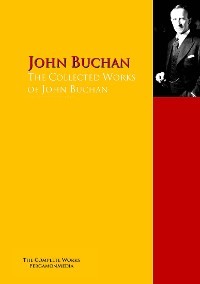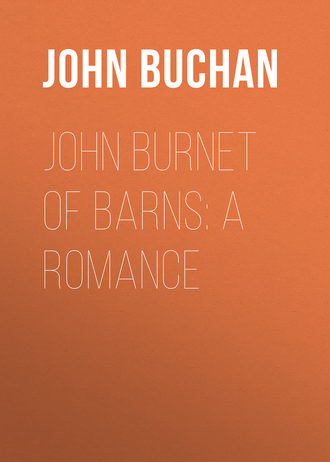 полная версия
полная версияJohn Burnet of Barns: A Romance
But this book-work was, after all, but half of my life, and that the less memorable. All the sights and sounds of that green upland vale are linked for me with memories of boyish fantasies. I used to climb up the ridge of Scrape when the sun set and dream that the serried ranks of hills were a new country where all was strange, though I knew well that an hour of the morning would dispel the fancy. Then I would descend from the heights, and for weeks be so fiercely set on the sports of the time of year that I had scarcely time for a grave thought. I have often gone forth to the lambing with the shepherds, toiled all day in the brown moors, and at night dropped straight off to sleep as I sat in my chair at meat. Then there was the salmon-fishing in the late spring, when the blood ran hot at the flare of the torches and the shimmer of the spears, and I, a forlorn young fool, shivered in my skin as the keen wind blew down the water. There was the swing and crackle of the stones in winter when the haughlands of Manor were flooded, and a dozen brown-faced men came to the curling and the air rang with shouts and laughter. I have mind, too, of fierce days of snow when men looked solemn and the world was so quiet that I whistled to keep me from despondency, and the kitchen at Barns was like a place in an inn with famishing men and dripping garments. Then Tweed would be buried under some great drift and its kindly flow sorely missed by man and beast. But best I remember the loosening of winter, when the rains from the moors sent down the river roaring-red, and the vale was one pageant of delicate greenery and turbid brown torrent.
Often I would take my books and go into the heart of the hills for days and nights. This, my father scarce liked, but he never hindered me. It was glorious to kindle your fire in the neuk of a glen, broil your trout, and make your supper under the vault of the pure sky. Sweet, too, at noonday to lie beside the wellhead of some lonely burn, and think of many things that can never be set down and are scarce remembered. But these were but dreams, and this is not their chronicle; so it behooves me to shut my ear to vagrom memories.
To Dawyck I went the more often the older I grew. For Marjory Veitch had grown into a beautiful, lissom girl, with the same old litheness of body and gaiety of spirit. She was my comrade in countless escapades, and though I have travelled the world since then I have never found a readier or a braver. But with the years she grew more maidenly, and I dared less to lead her into mad ventures. Nay, I who had played with her in the woods and fished and raced with her as with some other lad, began to feel a foolish awe in her presence, and worshipped her from afar. The fairy learning of her childhood was but the index of a wistfulness and delicacy of nature which, to my grosser spirit, seemed something to uncover one's head before. I have loved her dearly all my life, but I have never more than half understood her; which is a good gift of God to most men, for the confounding of vanity.
To her a great sorrow had come. For when she was scarce thirteen, her father, the laird of Dawyck, who had been ever of a home-keeping nature, died from a fall while hunting on the brow of Scrape. He had been her childhood's companion, and she mourned for him as sorely as ever human being mourned for another. Michael, her only brother, was far abroad in a regiment of the Scots French Guards, so she was left alone in the great house with no other company than the servants and a cross-grained aunt who heard but one word in twenty. For this reason I rode over the oftener to comfort her loneliness.
CHAPTER III
THE SPATE IN TWEED
The year 1683 was with us the driest year in any man's memory. From the end of April to the end of July we had scarce a shower. The hay-harvest was ruined beyond repair, and man and beast were sick with the sultry days. It was on the last Monday of July that I, wearied with wandering listlessly about the house, bethought myself of riding to Peebles to see the great match at bowls which is played every year for the silver horn. I had no expectation of a keen game, for the green was sure to be well-nigh ruined with the sun, and men had lost spirit in such weather. But the faintest interest is better than purposeless idleness, so I roused myself from languor and set out.
I saddled Maisie the younger, for this is a family name among our horses, and rode down by the Tweed side to the town. The river ran in the midst of a great bed of sun-baked gravel – a little trickle that a man might step across. I do not know where the fish had gone, but they, too, seemed scared by the heat, for not a trout plashed to relieve the hot silence. When I came to the Manor pool I stood still in wonder, for there for the first time in my life I saw the stream dry. Manor, which is in winter a roaring torrent and at other times a clear, full stream, had not a drop of running water in its bed; naught but a few stagnant pools green with slime. It was a grateful change to escape from the sun into the coolness of the Neidpath woods; but even there a change was seen, for the ferns hung their fronds wearily and the moss had lost all its greenness. When once more I came out to the sun, its beating on my face was so fierce that it almost burned, and I was glad when I came to the town, and the shade of tree and dwelling.
The bowling-green of Peebles, which is one of the best in the country, lies at the west end of the High Street at the back of the Castle Hill. It looks down on Tweed and Peebles Water, where they meet at the Cuddie's Pool, and thence over a wide stretch of landscape to the high hills. The turf had been kept with constant waterings, but, notwithstanding, it looked grey and withered. Here I found half the men-folk of Peebles assembled and many from the villages near, to see the match which is the greatest event of the month. Each player wore a ribband of a special colour. Most of them had stripped off their coats and jerkins to give their arms free play, and some of the best were busied in taking counsel with their friends as to the lie of the green. The landlord of the Crosskeys was there with a great red favour stuck in his hat, looking, as I thought, too fat and rubicund a man to have a steady eye. Near him was Peter Crustcrackit the tailor, a little wiry man with legs bent from sitting cross-legged, thin active hands, and keen eyes well used to the sewing of fine work. Then there were carters and shepherds, stout fellows with bronzed faces and great brawny chests, and the miller of the Wauk-mill, who was reported the best bowl-player in the town. Some of the folk had come down like myself merely to watch; and among them I saw Andrew Greenlees, the surgeon, who had tended me what time I went over the cauld. A motley crowd of the odds and ends of the place hung around or sat on the low wall – poachers and black-fishers and all the riff-raff of the town.
The jack was set, the order of the game arranged, and the play commenced. A long man from the Quair Water began, and sent his bowl curling up the green not four inches from the mark.
"Weel dune for Quair Water," said one. "They're nane sae blind thereaways."
Then a flesher's lad came and sent a shot close on the heels of the other and lay by his side.
At this, there were loud cries of "Weel dune, Coo's Blether," which was a name they had for him; and the fellow grew red and withdrew to the back.
Next came a little nervous man, who looked entreatingly at the bystanders as if to bespeak their consideration. "Jock Look-up, my dear," said a man solemnly, "compose your anxious mind, for thae auld wizened airms o' yours 'll no send it half-road." The little man sighed and played his bowl: it was even as the other had said, for his shot was adjudged a hogg and put off the green.
Then many others played till the green was crowded at one end with the balls. They played in rinks, and interest fell off for some little time till it came to the turn of the two acknowledged champions, Master Crustcrackit and the miller, to play against one another. Then the onlookers crowded round once more.
The miller sent a long swinging shot which touched the jack and carried it some inches onward. Then a bowl from the tailor curled round and lay between them and the former mark. Now arose a great dispute (for the players of Peebles had a way of their own, and to understand their rules required no ordinary share of brains) as to the propriety of Master Crustcrackit's shot, some alleging that he had played off the cloth, others defending. The miller grew furiously warm.
"Ye wee, sneck-drawin' tailor-body, wad ye set up your bit feckless face against a man o' place and siller?"
"Haud your tongue, miller," cried one. "Ye've nae cause to speak ill o' the way God made a man."
Master Crustcrackit, however, needed no defender. He was ready in a second.
"And what dae ye ca' yoursel' but a great, God-forsaken dad o' a man, wi' a wame like Braid Law and a mouth like the bottomless pit for yill and beef and a' manner o' carnal bakemeats. You to speak abune your breath to me," and he hopped round his antagonist like an enraged fighting-cock.
What the miller would have said no one may guess, had not a middle-aged man, who had been sitting on a settle placidly smoking a long white pipe, come up to see what was the dispute. He was dressed in a long black coat, with small-clothes of black, and broad silver-buckled shoon. The plain white cravat around his neck marked him for a minister.
"William Laverlaw and you, Peter Crustcrackit, as the minister of this parish, I command ye to be silent. I will have no disturbance on this public green. Nay, for I will adjudge your difference myself."
All were silent in a second, and a hush of interest fell on the place.
"But that canna be," grumbled the miller, "for ye're nae great hand at the bowls."
The minister stared sternly at the speaker, who sank at once into an aggrieved quiet. "As God has appointed me the spiritual guide of this unworthy town, so also has He made me your master in secular affairs. I will settle your disputes and none other. And, sir, if you or any other dare gainsay me, then I shall feel justified in leaving argument for force, and the man who offends I shall fling into the Cuddie's Pool for the clearing of his brain and the benefit of his soul." He spoke in a slow, methodical tone, rolling the words over his tongue. Then I remembered the many stories I had heard of this man's autocratic rule over the folk of the good town of Peebles; how he, alien like to whig and prelatist, went on his steadfast path caring for no man and snapping his fingers at the mandates of authority. And indeed in the quiet fierce face and weighty jaws there was something which debarred men from meddling with their owner.
Such was his influence on the people that none dared oppose him, and he gave his decision, which seemed to me to be a just and fair one. After this they fell to their play once more.
Meantime I had been looking on at the sport from the vantage-ground of the low wall which looked down on the river. I had debated a question of farriery with the surgeon, who was also something of a horse-doctor; and called out greetings to the different players, according as I favoured their colours. Then when the game no longer amused me, I had fallen to looking over the country, down to the edge of the water where the small thatched cottages were yellow in the heat, and away up the broad empty channel of Tweed. The cauld, where salmon leap in the spring and autumn, and which is the greatest cauld on the river unless it be the one at Melrose, might have been crossed dryshod. I began to hate the weariful, everlasting glare and sigh for the clouds once more, and the soft moist turf and the hazy skyline. Now it was so heavily oppressive that a man could scarce draw a free breath. The players dripped with sweat and looked nigh exhausted, and for myself the sulphurous air weighed on me like a mount of lead and confused such wits as I had.
Even as I looked I saw a strange thing on the river bank which chained my languid curiosity. For down the haugh, swinging along at a great pace, came a man, the like of whom I had seldom seen. He ran at a steady trot more like a horse than a human creature, with his arms set close by his sides and without bonnet or shoes. His head swung from side to side as with excessive weariness, and even at that distance I could see how he panted. In a trice he was over Peebles Water and had ascended the bank to the bowling-green, cleared the low dyke, and stood gaping before us. Now I saw him plainer, and I have rarely seen a stranger sight. He seemed to have come a great distance, but no sweat stood on his brow; only a dun copper colour marking the effect of the hot sun. His breeches were utterly ragged and in places showed his long supple limbs. A shock of black hair covered his head and shaded his swarthy face. His eyes were wild and keen as a hawk's, and his tongue hung out of his mouth like a dog's in a chase. Every man stopped his play and looked at the queer newcomer. A whisper went round the place that it was that "fule callant frae Brochtoun," but this brought no news to me.
The man stood still for maybe three minutes with his eyes fixed on the ground as if to recover breath. Then he got up with dazed glances, like one wakening from sleep. He stared at me, then at the players, and burst into his tale, speaking in a high, excited voice.
"I hae run frae Drummeller to bring ye word. Quick and get the folk out o' the waterside hooses or the feck o' the toun 'll be soomin' to Berwick in an 'oor."
No one spoke, but all stared as if they took him for a madman.
"There's been an awfu' storm up i' the muirs," he went on, panting, "and Tweed's com in' doun like a mill-race. The herd o' Powmood tellt me, and I got twae 'oors start o't and cam off here what I could rin. Get the folk out o' the waterside hooses when I bid ye, wi' a' their gear and plenishing, or there'll no be sae muckle as a groat's worth left by nicht. Up wi' ye and haste, for there's nae time to lose. I heard the roar o' the water miles off, louder than ony thunderstorm and mair terrible than an army wi' banners. Quick, ye auld doited bodies, if ye dinna want to hae mourning and lamentation i' the toun o' Peebles."
At this, as you may believe, a great change passed over all. Some made no words about it, but rushed into the town to give the alarm; others stared stupidly as if waiting for more news; while some were disposed to treat the whole matter as a hoax. This enraged the newsbearer beyond telling. Springing up, he pointed to the western sky, and far off we saw a thick blackness creeping up the skyline. "If ye'll no believe me," said he, "will ye believe the finger of God?" The word and the sight convinced the most distrusting.
Now Tweed, unlike all other rivers of my knowledge, rises terribly at the first rain and travels slowly, so that Tweedsmuir may be under five feet of water and Peebles high and dry. This makes the whole valley a place of exceeding danger in sultry weather, for no man knows when a thunderstorm may break in the hills and send the stream down a raging torrent. This, too, makes it possible to hear word of a flood before it comes, and by God's grace to provide against it.
The green was soon deserted. I rushed down to the waterside houses, which were in the nearest peril, and in shorter time than it takes to tell, we had the people out and as much of their belongings as were worth the saving; then we hastened to the low-lying cottages on Tweed Green and did likewise. Some of the folk seemed willing to resist, because, as they said, "Whae kenned but that the body micht be a leear and they werena to hae a' this wark for naething?" For the great floods were but a tradition, and only the old men had seen the ruin which the spate could work. Nevertheless, even these were convinced by a threatening sky and a few words from the newsbearer's trenchant tongue. Soon the High Street and the wynds were thick with household belongings, and the Castle Hill was crowded with folk to see the coming of the flood.
By this time the grim line of black had grown over half the sky, and down fell great drops of rain into the white, sun-baked channel. It was strange to watch these mighty splashes falling into the little stagnant pools and the runlets of flowing water. And still the close, thick heat hung over all, and men looked at the dawnings of the storm with sweat running over their brows. With the rain came a mist – a white ghastly haze which obliterated the hills and came down nigh to the stream. A sound, too, grew upon our ears, at first far away and dim, but increasing till it became a dull hollow thunder, varied with a strange crackling, swishing noise which made a man eery to listen to. Then all of a sudden the full blast of the thing came upon us. Men held their breaths as the wind and rain choked them and drove them back. It was scarce possible to see far before, but the outlines of the gorge of Neidpath fleeted through the drift, whence the river issued. Every man turned his eyes thither and strained them to pierce the gloom.
Suddenly round the corner of the hill appeared a great yellow wave crested with white foam and filling the whole space. Down it came roaring and hissing, mowing the pines by the waterside as a reaper mows down hay with a scythe. Then with a mighty bound it broke from the hill-barriers and spread over the haugh. Now, the sound was like the bubbling of a pot ere it boils. We watched it in terror and admiration, as it swept on its awful course. In a trice it was at the cauld, and the cauld disappeared under a whirl of foam; now it was on the houses, and the walls went in like nutshells and the rubble was borne onward. A cry got up of "the bridge," and all hung in wonder as it neared the old stonework, the first barrier to the torrent's course, the brave bridge of Peebles. It flung itself on it with fiendish violence, but the stout masonwork stood firm, and the boiling tide went on through the narrow arches, leaving the bridge standing unshaken, as it had stood against many a flood. As we looked, we one and all broke into a cheer in honour of the old masons who had made so trusty a piece of stone.
I found myself in the crowd of spectators standing next to the man who had brought the tidings. He had recovered his breath and was watching the sight with a look half of interest and half of vexation. When all was past and only the turbid river remained, he shook himself like a dog and made to elbow his way out. "I maun be awa'," he said, speaking to himself, "and a sair job I'll hae gettin' ower Lyne Water." When I heard him I turned round and confronted him. There was something so pleasing about his face, his keen eyes and alert head, that I could not forbear from offering him my hand, and telling him of my admiration for his deed. I was still but a boy and he was clearly some years my elder, so I made the advance, I doubt not, with a certain shyness and hesitancy. He looked at me sharply and smiled.
"Ye're the young laird o' Barns," said he; "I ken ye weel though ye maybe are no aquaint wi' me. I'm muckle honoured, sir, and gin ye'll come Brochtoun-ways sometime and speir for Nicol Plenderleith, he'll tak ye to burns that were never fished afore and hills that never heard the sound o' a shot."
I thanked him, and watched him slipping through the crowd till he was lost to view. This was my first meeting with Nicol Plenderleith, of whose ways and doings this tale shall have much to say. The glamour of the strange fellow was still upon me as I set myself to make my road home. I am almost ashamed to tell of my misfortunes; for after crossing the bridge and riding to Manor Water, I found that this stream likewise had risen and had not left a bridge in its whole course. So I had to go up as far as St. Gordians' Cross before I could win over it, and did not reach Barns till after midnight, where I found my father half-crazy with concern for me and Tam Todd making ready to go and seek me.
CHAPTER IV
I GO TO THE COLLEGE AT GLASGOW
By this time I had grown a great stalwart lad, little above the middle height, but broad and sinewy. I had made progress in all manly sports and could fling the hammer almost as far as the Manor blacksmith, while in leaping and running I had few rivals among lads of my age. Also I was no bad swordsman, but could stand my own against all the wiles of Tam Todd, and once even disarmed him to his own unspeakable disgust. In my studies, which I pursued as diligently as I could with no teachers and not over-many books, I had made some little advance, having read through most of the Greek tragedians and advanced some distance in the study of Plato; while in the Latin tongue I had become such an adept that I could both read and write it with ease.
When I had reached the mature age of eighteen, who should come up into our parts but my famous relative, Master Gilbert Burnet, the preacher at St. Clement's in London, of whom I have already spoken. He was making a journey to Edinburgh and had turned out of his way to revive an old acquaintance. My father was overjoyed to see him and treated him to the best the house could produce. He stayed with us two days, and I remember him still as he sat in a great armchair opposite my father, with his broad velvet cap and grey, peaked beard, and weighty brows. Yet when he willed, though for ordinary a silent man, he could talk as gaily and wittily as any town gallant; so much indeed that my father, who was somewhat hard to please, declared him the best companion he ever remembered.
Before he left, Master Burnet examined me on my progress in polite learning, and finding me well advanced, he would have it that I should be sent forthwith to Glasgow College. He exacted a promise from my father to see to this, and left behind him, when he departed, letters of introduction to many of the folk there, for he himself had, at one time, been professor of divinity in the place. As for myself, I was nothing loth to go, and see places beyond Tweeddale and add to my stock of learning; for about this time a great enthusiasm for letters had seized me (which I suppose happens at some time or other to most men), and I conceived my proper vocation in life to be that of the scholar. I have found in an old manuscript book a list of the titles of imaginary works, editions, poems, treatises, all with my unworthy name subscribed as the author. So it was settled that I should ride to Glasgow and take lodgings in the town for the sake of the college classes.
I set out one November morning, riding Maisie alone, for no student was allowed to have a servant, nor any one below the degree of Master of Arts. The air was keen and frosty, and I rode in high fettle by the towns of Biggar and Lanark to the valley of the Clyde. I lay all night at Crossford in the house of a distant relative. Thence the next day I rode to Hamilton and in the evening came to the bridge of the Clyde at Glasgow. Then I presented myself to the Principal and Regents of the college and was duly admitted, putting on the red gown, the badge of the student class, than which I believe there is no more hideous habiliment.
The college in those days was poor enough, having been well-nigh ruined by the extortions of Lord Middleton and his drunken crew; and it had not yet benefited by the rich donations of the Reverend Zachary Boyd of the Barony Kirk. Still, the standard of learning in the place was extraordinarily high, especially in dialectic and philosophy – a standard which had been set by the famous Andrew Melville when he was a professor in the place. I have heard disputations there in the evenings between the schoolmen and the new philosophers, the like of which could scarcely be got from the length and breadth of the land.
Across the High Street were the college gardens and green pleasant orchards where the professors were wont to walk and the scholars to have their games. Through the middle ran the clear Molendinar Burn, so called by the old Romans, and here I loved to watch the trout and young salmon leaping. There was a severe rule against scholars fishing in the stream, so I was fain to content myself with the sight. For soon a violent fit of home-sickness seized me, and I longed for the rush of Tweed and the pleasant sweep of Manor; so it was one of my greatest consolations to look at this water and fancy myself far away from the town. One other lad who came from Perthshire used to come and stand with me and tell me great tales of his fishing exploits; and I did likewise with him till we became great companions. Many afternoons I spent here, sometimes with a book and sometimes without one; in the fine weather I would lie on the grass and dream, and in rough, boisterous winter days I loved to watch the Molendinar, flooded and angry, fling its red waters against the old stones of the bridge.


